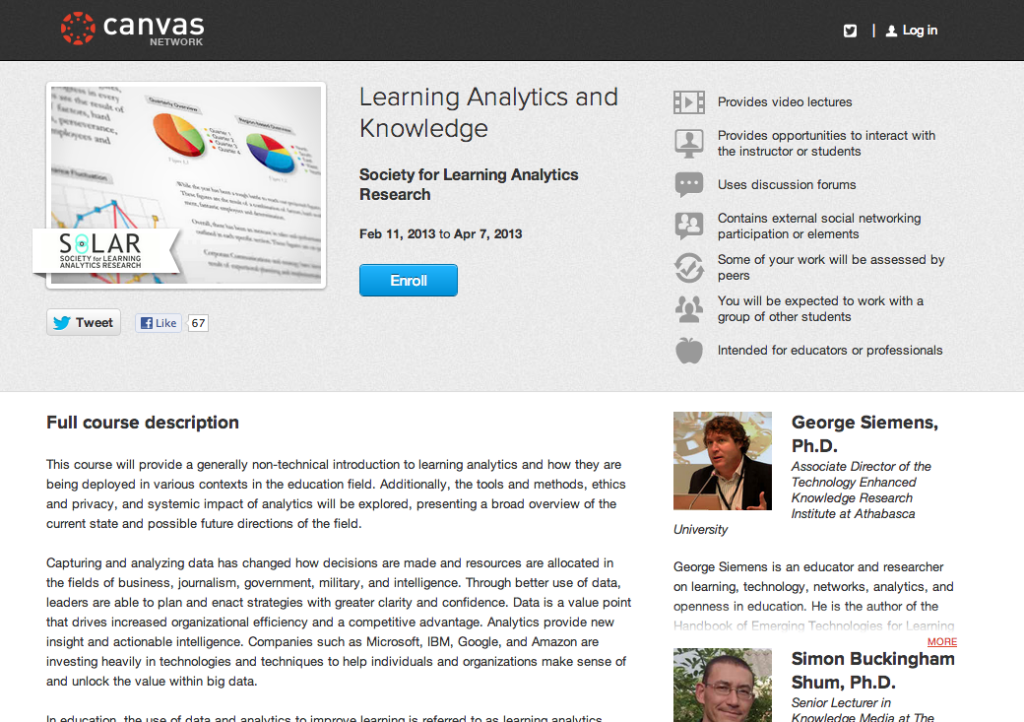Desde la explosión en 2012 de los MOOC (Massive Open Online Course), cursos online masivos y abiertos, se ha desarrollado una interesante y variada oferta vinculada a temas educativos. Este artículo pretende recoger, a 8 de febrero de 2013, los más señalados. Algunos de ellos ya se encuentran en marcha y otros empezarán en breve.
La mayoría de ellos son en inglés. Me limito a incluir una descripción obtenida de su propia web y, en algún caso, un comentario personal.

Learning Analytics and Knowledge
George Siemens, Simon Buckingham Shum, Shane Dawson, Erik Duval, Dragan Gaševi? & Fridolin Wild (Society for Learning Analytics Research).
This course will provide a generally non-technical introduction to learning analytics and how they are being deployed in various contexts in the education field. Additionally, the tools and methods, ethics and privacy, and systemic impact of analytics will be explored, presenting a broad overview of the current state and possible future directions of the field.
Se trata de uno de los cursos más prometedores sobre un nuevo campo de investigación que empieza a desarrollarse, el Learning Analytics. Intenta aprovechar la ingente cantidad de datos derivados de la educación online, aplicando de alguna manera la idea del big data a este campo.
En julio se celebra un seminario en Stanford sobre el tema. Dado que están organizándose eventos paralelos en distintos países y universidades, el GrinUGR ya está contacto con los responsables para organizar una versión de dicho seminario en nuestra universidad tomando como referencias las ponencias que allí se realicen. Os facilitaré más detalles a lo largo de los próximos meses.
Educational Technology & Media
Alec Couros y una larga lista.
Se trata de un MOOC conectivista (cMOOC) en la línea más próxima a los organizados por los pioneros en el tema, Downes y Siemens. Estas son las claves de esta propuesta:
#etmooc is a ‘Connectivist’ MOOC (‘cMOOC) that is designed around a few key principles:
- The course is developed with a weak ‘centre’. While etmooc.org will provide a level of aggregation, detail, and direction, the majority of interactions are likely to occur within groups & networks, facilitated through various online spaces & services.
- Participants are strongly encouraged to develop their own reflective, learning spaces. We’re hoping that every learner in #etmooc creates and maintains their own blog for continuous reflection, creativity, and resource sharing.
- Sharing and network participation are essential for the success of all learners in #etmooc. Thus, we’ll be needing you to share your knowledge, to support and encourage others, and to participate in meaningful conversations.
Entre los temas que se abordan están: Digital Storytelling – Multimedia, Remixes & Mashups; Digital Literacy – Information, Memes & Attention; The Open Movement – Open Access, OERs & Future of Education; Digital Citizenship – Identity, Footprint, & Social Activism.

Learning Creative Learning
Mitch Resnick (director del Lifelong Kindergarten y LEGO Papert Professor en el MIT Media Lab).
Learning Creative Learning is a course offered at the MIT Media Lab. It introduces ideas and strategies for designing technologies to support creative learning. This semester, for the first time, P2PU and the Media Lab are working together to bring the course online. We are opening up the seminars, course materials, and hands-on activities to anyone with a computer and Internet access. It’s a big experiment, we expect to learn a lot, and we hope you’ll enjoy it.
A diferencia de otros cursos este se encuentra montado sobre la plataforma P2PU. Quizá es una de las características más interesantes. Ellos mismos lo justifican en la presentación del curso para ganar flexibilidad empleando herramientas open source o gratuitas en la red. No utilizan la plataforma edX, en la que participa el MIT junto a Harvard y Berkeley.
Check out our shiny new platform
Actually, don’t, because we didn’t build a shiny new platform. Our platform is the web and we like things distributed and open. We also wanted to create a model that is easy to replicate for anyone. We use off-the-shelf Google+ tools, like Hangouts and Google+ communities; and open source software like the Mechanical MOOC (github). You have no excuse not to build a course like this yourself!
Si estás interesado en participar, la primera ronda de inscripciones está abierta hasta hoy mismo, día 8 de febrero. Parece que están formando grupos de trabajo dentro del curso. Si alguien quiere compartir uno conmigo, el código que debe incluir en el registro es el 18273. Si no, supongo que los asignarán automáticamente.
E-learning and Digital Cultures
Jeremy Knox, Sian Bayne, Hamish Macleod, Jen Ross, Christine Sinclair (University of Edinburgh).
Se desarrolla en la plataforma Coursera. Actualmente está en su segunda semana.
E-learning and Digital Cultures is aimed at teachers, learning technologists, and people with a general interest in education who want to deepen their understanding of what it means to teach and learn in the digital age. The course is about how digital cultures intersect with learning cultures online, and how our ideas about online education are shaped through “narratives”, or big stories, about the relationship between people and technology. We’ll explore some of the most engaging perspectives on digital culture in its popular and academic forms, and we’ll consider how our practices as teachers and learners are informed by the difference of the digital. We’ll look at how learning and literacy is represented in popular digital-, (or cyber-) culture. For example, how is ‘learning’ represented in the film The Matrix, and how does this representation influence our understanding of the nature of e-learning?

Fundamentals of Online Education: Planning and Application
Fatimah Wirth (Georgia Tech).
In this course you will learn about the fundamentals of online education. The emphasis will be on planning and application. In the planning phase, you will explore online learning pedagogy, online course design,privacy and copyright issues, online assessments, managing an online class, web tools and Learning Management Systems. In the application phase, you will create online learning materials. The final project for the course will consist of you building an online course based on everything that you learned and created in the course.
Este curso, desarrollado en Coursera, se ha convertido en un ejemplo de mala gestión de la multitud de usuarios que puede inscribirse en un MOOC. Tratándose de un curso sobre Online Education: Planning and Application el infortunio no puede ser mayor. Los responsables decidieron formar grupos con los inscritos, sin embargo el sistema para hacerlo no era automático generando múltiples problemas. Por ejemplo, intentaron utilizar una hoja compartida de Google Docs para que la gente indicara su nombre en el grupo en el que deseaba participar. Esto resultó un caos, dado que las ediciones simultáneas de Google Docs suelen acabar en información perdida en muchos casos. Tras probar varios sistemas el curso se ha suspendido hasta una próxima edición en la que se resuelvan eficazmente estas cuestiones. Actualmente iría por su segunda semana. Ha sido muy interesante observar los cientos de comentarios de los alumnos inscritos sobre las deficiencias en el sistema y la planificación. Una conclusión: planifica e intenta prever los problemas que puedan surgir. Cuando son decenas de miles los inscritos, las críticas y el caos lógicamente se multiplican.
El humanista digital
Juan Luis Suarez (CulturePlex, University of Western Ontario)
Una iniciativa muy acertada y oportuna en la línea de las Ciencias Sociales y Humanidades Digitales.
“El Humanista Digital” es el primer curso de humanidades digitales ofrecido en español en la modalidad MOOC, es decir, completamente abierto y gratuito en todo el mundo. Impartido por Juan Luis Suárez y el equipo de The CulturePlex Lab, en Western U. (Canadá), el curso ofrece una excelente oportunidad para conocer en detalle qué son las humanidades digitales, qué está pasando en ese mundo, cómo se puede crear un currículum en el área y qué habilidades deben desarrollar y enseñar los humanistas para hacer avanzar nuestras disciplinas y hablar a las nuevas generaciones en su propio “medio”. Uno de los objetivos del curso es fomentar el crecimiento de la comunidad de humanistas digitales de habla española y portuguesa.

